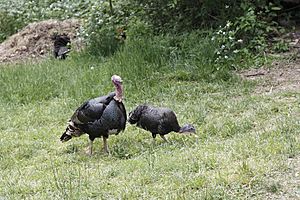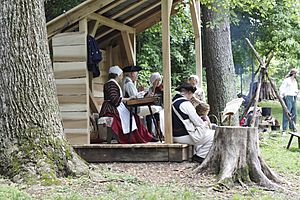Claude Moore Colonial Farm facts for kids
| Lua error in Module:Location_map at line 420: attempt to index field 'wikibase' (a nil value). | |
| Established | 1973 |
|---|---|
| Dissolved | 21 December 2018 |
| Location | 6310 Georgetown Pike, McLean, Virginia, U.S. |
| Type | Living museum |
The Claude Moore Colonial Farm was a special park in Virginia. It was first called Turkey Run Farm. This park showed what life was like on a tenant farm around the year 1771. A tenant farm was a place where farmers rented land to grow crops.
The farm closed its doors for good on December 21, 2018. After it closed, the National Park Service began making plans for what to do with the park and its buildings.
A group called the Friends of Claude Moore Colonial Farm paid for all the activities at the farm. The land itself was owned by the National Park Service. The farm was in McLean, Virginia, which is a town near Washington, D.C. It was also close to the George Bush Center for Intelligence.
The main goal of the Claude Moore Colonial Farm was to show how tenant farmers lived in 1771. Most people in Virginia at that time were tenant farmers. They grew tobacco to pay their rent. They also grew food for themselves to eat. This was different from places like Colonial Williamsburg, which mostly showed the lives of rich landowners and merchants.
The Farm's Story
The farm first opened in July 1973. It was called Turkey Run Farm back then and was run by the National Park Service. In 1981, the farm was renamed after Dr. Claude Moore. He was a local land developer who left a lot of money to the farm when he passed away. This gift helped the farm become the only independent site in the National Park system.
This meant the farm did not get money from the National Park Service. Instead, it used money from its special fund, donations from people, and money raised by volunteers. Over the years, the farm added new things. It got a gift shop called the GateHouse. It also added an event deck and a garden called the Bounty Garden.
After 2001, a new road was built. This road made it easier and safer to get to the farm office. In 2011, a place called "Chez Puce" became a full-time used-book store. It was open several days a week.
How the Farm Worked
The farm had a small team of paid workers. Many volunteers also helped out. Some volunteers even dressed up in old-fashioned clothes. They showed what farm life was like in the mid-1700s. This included working in the fields, making crafts, and cooking.
The staff and volunteers acted as if they were people from the past. This helped visitors feel like they had traveled back in time. The farm grew old types of crops and raised special kinds of animals. Everything was carefully researched to be as real as possible.
The farm also worked with Fairfax County, Virginia. It offered jobs to people who needed to complete court-ordered work. This work often involved labor on the farm.
Fun Events at the Farm
One of the most exciting events was the Market Fair. It happened three times a year, in May, July, and October. Many volunteers helped make the fair special. There was a blacksmith, who worked with metal, and a cabinet maker. There was also someone who sold hats and another who sold herbs and flowers.
The fair had a toy store, a place to write letters, and a puppet show. You could also find roasted chicken and a tavern. Many people at the Market Fair were part of groups that re-enacted the American Revolutionary War. They often went to other history events too.
Other regular events included harvesting wheat and preparing the tobacco crop. The last event of the year was a colonial Wassail in December. This celebration included a special blessing for the orchard.
The Farm's Closing
The Claude Moore Colonial Farm stopped being open to visitors on December 21, 2018.
See Also
- Open-air museum



